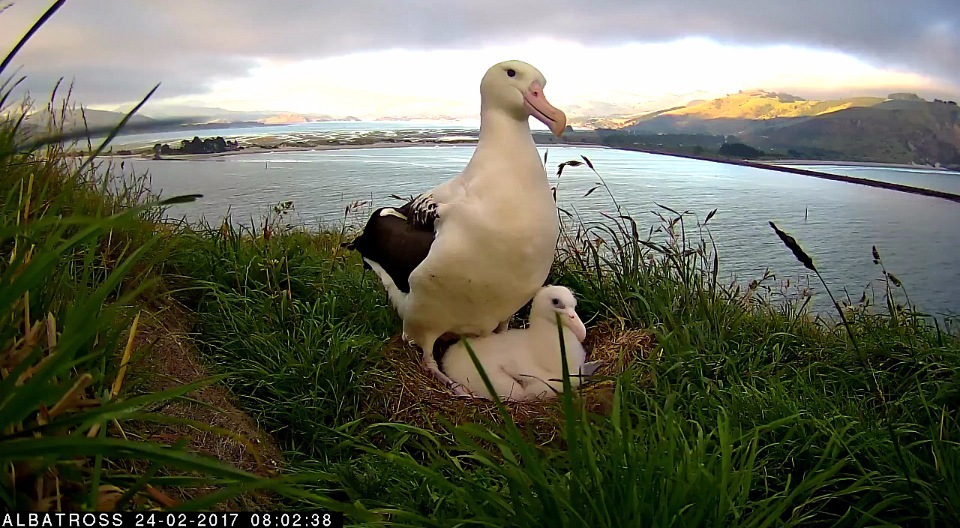Kādi mazi spārniņi

07;16
Blakus atlido kāds lielais albatross un mazulis klabina savu knābīti,tad vēro atlidojušo

Tur ir minēts, ka tad, kad putnēns ir pietiekami liels (nav pateikts cik liels), tad arī viens vecāks var izbarot, bet šitik mazi nevar palikt vieni, kamēr vecāks ir jūrā. Vēl ir minēts, ka teorētiski arī cilvēki var mēgināt izbarot pusbāreni, bet labāks variants ir, ja sameklē audžuvecākus. Varbūt kāds var iztulkot precīzi. Man tagad nav laika.Raganiete wrote:Paldies,roosaluristaja.Lai mazo putnēnu izbarotu vajadzīgi abi vecāki?To visu var izdarīt tikai ar cilvēku palīdzību.
Pazudis viens putns .........The Royal Albatross Centre
DOC Update from Head Ranger Lyndon Perriman
Missing one bird.........
Our checks of whom is on the nest each day are important to ensure the adults are regularly changing over at the nest.
We have a parent that has now been on the nest for 6 days continuous without any sign of her mate. The norm seems to be during the guard stage (when the chick has one of its parents at the nest for its first 4-6 weeks of life) for the adults to change over nest duties every 1-4 days. Six days isn't unheard of, and generally these longer periods are not that much of an issue so long as the chick continues to put weight on. Unfortunately for this chick is has been losing weight.
Yesterday's weight for that chick was 30% less than the day before and that led to that chick being moved to another nest so that it could receive a meal from another adult that still had food to give (we shifted it). Today that chick is now at its heaviest weight and with a full tummy it has been returned to its own mum (The second chick we swapped it with lost weight over night also indicating that the female at this nest has absolutely no more food to give).
We have a number of management techniques like this we can use to ensure we don't lose a chick to starvation and we will have to implement some more management of this adult and chick later today. The chick will need another feed by the afternoon so unless the missing bird turns up before then, I'll have to shift that chick to another nest so it can receive another good meal (alternatively we can supplementary feed the chick at this nest without the need to move it to another nest, but there are risks in us doing this with such a small chick, so obtaining a natural feed by another adult is always a better option). When this is done later today, I will pick a nest that has a large well fed chick in it. The chick would need to have a full tummy, so that it doesn't pester the adult that has no food to give. Likewise it would need to be one of the older chicks so if this hungry female adult does desert the nest in order to go to sea to feed, the chick should be large enough to survive its first night alone.
Alternatively we still have one nest were we have a pair sitting on a dummy egg (artificial egg), that pair lost their chick, so we have them sitting on a dummy egg for such cases as this, if the missing bird doesn't turn up in the next day or so then the chick might be permanently moved to this pair.
The missing bird..........It is Toroa, the 500th chick to have hatched on the headland and it is his mate whom is on their nest, hungry and waiting for him to turn up as we all are !!


Jā,smieklīgi tas izskatās,bet mazais klabina savu knābīti kā lielaislianaliesma wrote:8.13 Jau labu laiciņu kāds albatross mēģina pielabināties, pat apguļas blakus, bet mazais uzreiz vervelē, lai ejot prom, un mammīte arī... un viņš tad nu arī aiziet.
Labvakar !

